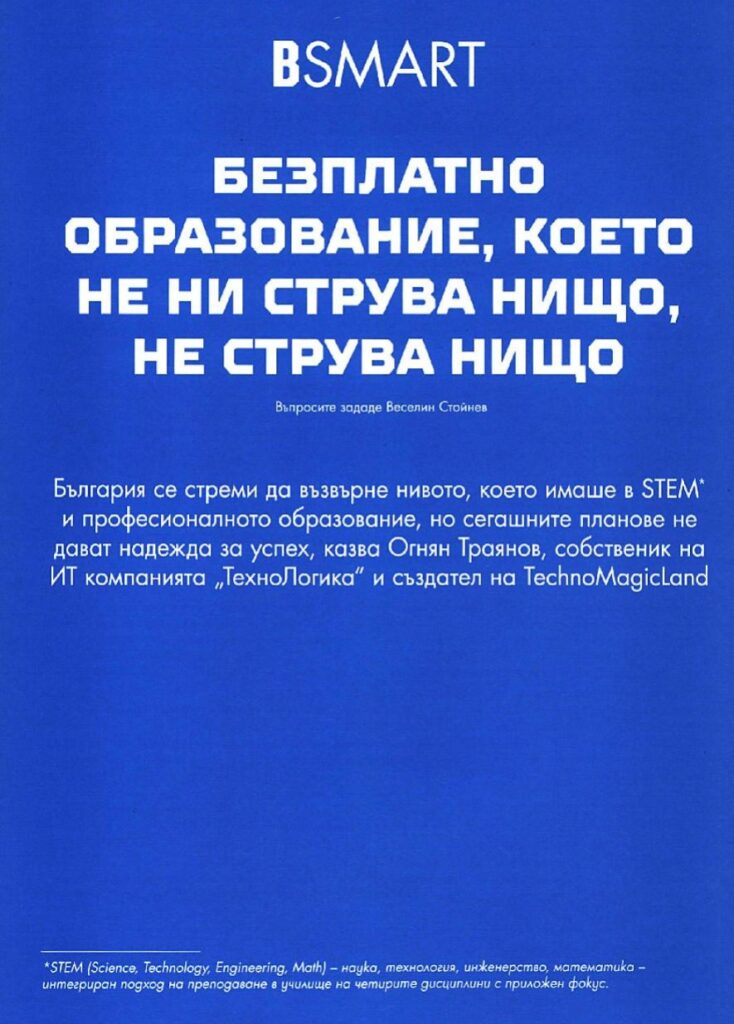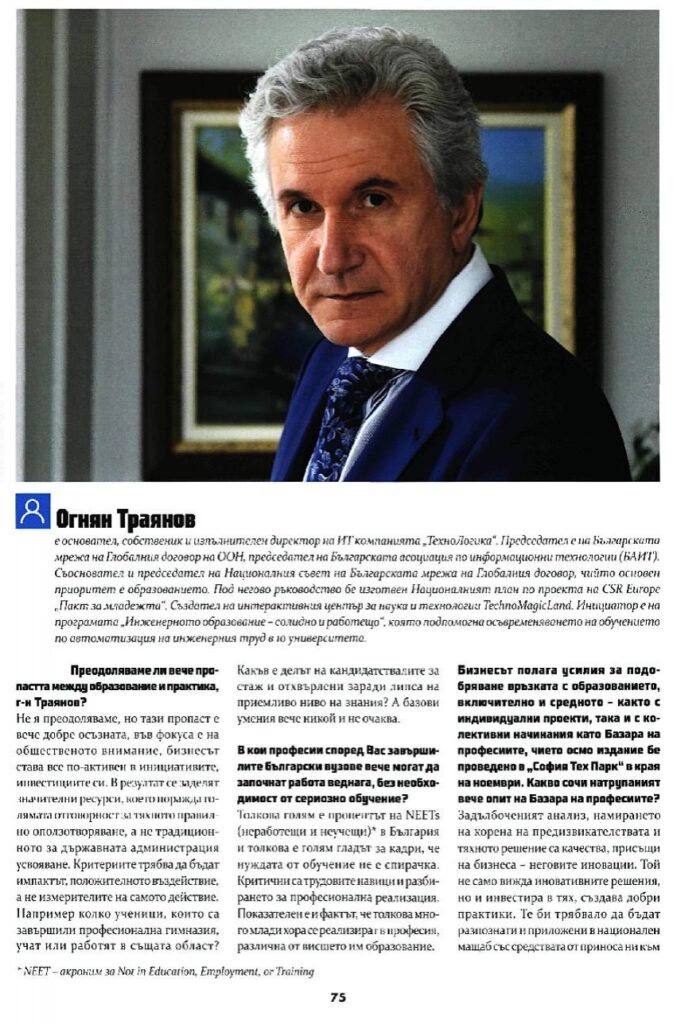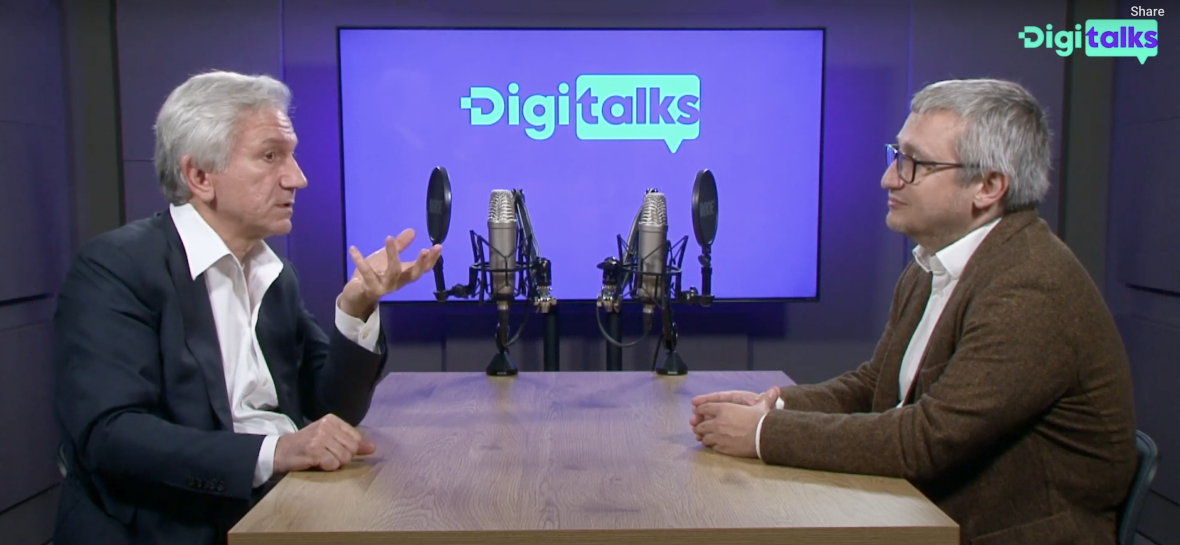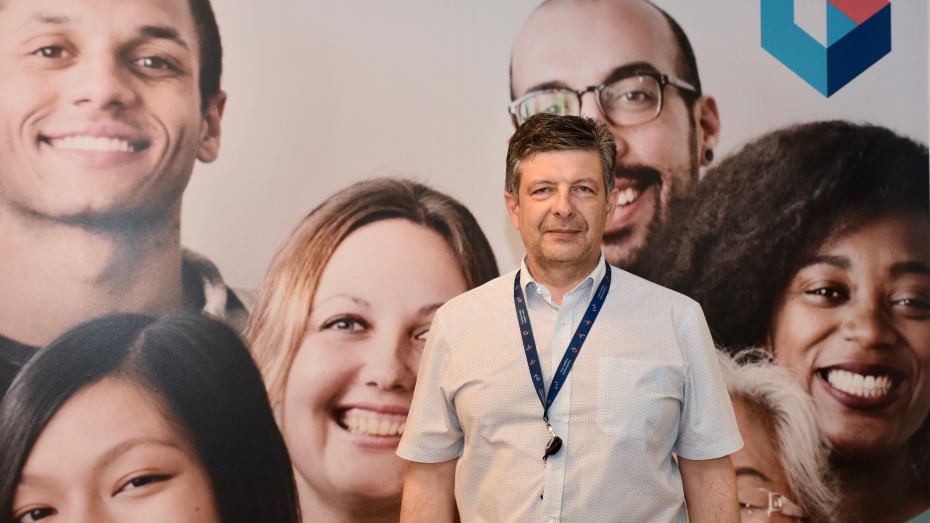Free education, i.e. education that costs nothing, is worthless, says Ognyan Trayanov in an interview for BGlobal magazine
Are we already bridging the gap between education and practice, Mr. Trayanov?
We have not yet bridged the gap, but it is already well understood — it is in the focus of public attention, businesses are becoming more proactive in their initiatives and investments. As a result, significant resources are being allocated, which comes with great responsibility to ensure their proper use as opposed to disbursing it as public administration traditionally does. The criteria should include impact — positive impact, not indicators that measure the action itself. For example, how many students who have graduated from a vocational school are working or pursuing further studies in the same field? What is the proportion of those who apply for internship and are rejected for lack of an acceptable level of basic knowledge? Because no one expects basic skills anymore.
In which professions do you think graduates of Bulgarian universities can start working immediately, without the need for serious training?
The percentage of NEETs (persons not in employment and education) in Bulgaria is so high and so acute are workforce shortages on the labour market that the need for training is not an obstacle. The critical factors are work habits and career path understanding. The fact that so many young people are pursuing careers other than higher education is also significant.
Businesses are making efforts to improve their relationship with education, including secondary education — both through individual projects and collective endeavours, such as the Professions Bazaar, the eighth edition of which was held in Sofia Tech Park at the end of November. What does the experience of the Professions Bazaar show?
In-depth analysis, finding the root of challenges and their solution are all qualities inherent to businesses and innovation. Businesses not only see innovative solutions — they also invest in them, create best practices. These should be recognised and implemented on a national scale with the money taxpayers pay to the government. If we don’t in achieving a reasonably smooth transition to education that is integrated with the market economy, then we will be forced to do it the hard way. We will have to convince ourselves that free education, i.e. education that costs nothing, is worthless, and we will choose the steep road to all-paid education. I know it sounds awful to every Bulgarian, but better ‘a horrible end than a horror without end’.

The eighth edition of the Job Fair once again proved that success is achieved with perseverance and sustainability. And during the pandemic, we still organised two virtual editions. It is increasingly clear that young people and their parents want to make responsible career choices. The marketplace also retains its format for initial introductions to professions, but there has been a growing interest in meeting and having a dialogue with professionals. There were more organised groups from schools, including schools outside Sofia, as well as visits from young people. Students were also impressed and took the opportunity to learn about the different specialisations in particular professions. The range of professions represented was also significantly broader.
Moving on to secondary education, Bulgaria has long been gaining experience with dual education and STEM programmes. Do you think there is a need for a new direction or reinvigoration in this area?
Bulgaria aims to regain the level it used to have in STEM and vocational education. There is a long way to go in both areas, and our success indicators are too low, given that investments in STEM centres for the purchase of 3D printers without basic skills on how to use them, the renovation and conversion of buildings and installing climbing walls are hailed as success. And current plans offer no hope of success either. The first investments will be in construction, buying equipment and only then do we start thinking about content and training teachers and class leaders. We build a room and only then do we decide that it will be a chemistry lab. However, it turns out that the room does not meet the requirements — it has no fireplace, no proper covering for the floor and for the tables, no air ducts, no safe space for the storage of materials, etc. We are buying modern equipment worth millions, but then training on how to use it is funded by another programme and that only comes a year or two later. And in the meantime, the equipment becomes obsolete and loses its value. Businesses in Bulgaria have а wealth of good practice with robotics clubs and STEM centres, such as TechnoMedicalLand, which was created to draw attention to the need for and the benefits of a STEM centre. Attractive classes on STEM subjects are held there — it is a grassroot organisation that provides practical, non-formal training to students through the experience and knowledge of various professionals — pedagogues, child psychologists, researchers, teachers, practitioners. Hundreds of experiments have been developed to illustrate teaching material and courses of interest. Chemistry and physics experiment kits have been designed for classroom teaching, in line with the curriculum and interest-based activities. In addition to equipment and supplies, the kits contain instructions and videos for optimal use. If the approach is changed and the content is chosen first, these kits would be a good example and would bring a guarantee of quality — teachers would receive training, they will be certified and then their schools could apply for them. The funds from their sale would be used in support of STEM education, as provided for in TechnoMagicLand’s charter according to which no profit is distributed to the founders.

Were there specific features in the dynamics of IT occupations during the Covid pandemic and the crisis that ensued?
The dynamics of occupations — old ones disappearing and new ones emerging — proceeds at normal pace for a fast growing industry such as the IT sector. There have been significant changes in the way we work, a hybrid model has become prevalent. The relatively good performance of teleworking encourages digital nomadism and challenging the corporate organisations. The temptation to freelance via platforms, the so-called gig economy, has grown. The pandemic brought a crisis, the war intensified it, we now expect a pronounced economic crisis in which the risk of these temptations will be felt.
Bulgaria is among the EU Member States that spend the least on science. How can businesses, and not only big companies, become involved in research and development?
There is no established ecosystem for innovation, although its launch can be financed with a modest share of the funds allocated from the national plan for cooperation between business and research institutes. I proposed such a concept back in 2011 on behalf of the Bulgarian Association for Information Technology (BAIT). It aims to create a market for innovations, innovative ideas in different phases of their completion — a fundamental prerequisite for stimulating and building an innovation ecosystem. Ognyan Trayanov is the founder, owner and CEO of the IT company TechnoLogica. He is Chairman of the Bulgarian Network of the UN Global Compact, Vice-Chairman of the Bulgarian Association for Information Technology (BAIT). Co-founder and Chairman of the National Council of the Bulgarian Global Compact Network, whose main priority is education. Under his leadership the National Plan of the CSR Europe project Youth Pact was prepared. Founder of the interactive science and technology centre TechnoMagicLand. He initiated the Engineering Education — Solid and Workable programme, which has helped to modernise engineering automation training in 10 universities.
Veselin STOYNEV


